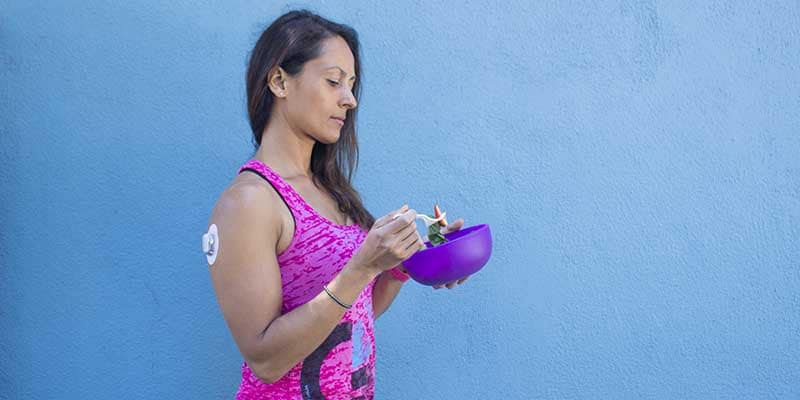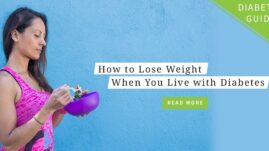Have you ever asked yourself, “Why am I gaining weight when I’m eating practically nothing?”
It could be the type of diet you’re following, or perhaps extra calories are sneaking in through frequent snacking or dining out. Or maybe cutting back on calories is actually contributing to the weight gain. Could that really be true?
This article will explore the factors affecting your weight, how overly restricting calories can harm your overall health, and the steps you can take to get back on track with your weight-loss goals.

Key Points:
- If you’re having difficulty losing or are gaining weight, a higher-protein diet may be more effective than other diets for weight loss.
- Incorporate regular physical activity, prioritize sleep, and manage stress, as these can impact weight-loss success.
- Certain medical conditions and medications can hinder weight loss or even contribute to weight gain. If you suspect this, consult your healthcare provider.
- Monitoring what and how much you eat significantly increases the chances of losing weight and maintaining it.
If you ask people how often they’ve gone on a diet to lose weight, many will likely say, “Too many times to count.” Maybe you’ve tried multiple times yourself, only to regain the weight — and then some. Or perhaps you didn’t lose any weight while dieting, or even gained weight. It’s undeniably frustrating.
While it may seem counterintuitive, eating fewer calories can sometimes lead to weight gain. This is often due to the body’s natural response to calorie restriction, known as metabolic adaptation or adaptive thermogenesis.
When you drastically cut calories, your body conserves energy by slowing your metabolism, making it harder to lose weight and easier to gain it.
Table of Contents
What the science says
You’re not alone in your weight-loss journey. The U.S. Centers for Disease Control and Prevention (CDC) reports that between 2013 and 2016, 49 percent of U.S. adults tried to lose weight within the past year.
More women (56 percent) than men (42 percent) were among those trying to shed pounds, and more than 160 million Americans are dieting at any given time.
Understanding the science behind weight loss helps explain why it can be so challenging, and why some people find it harder than others. However, the science isn’t as straightforward as we once thought.
The foundation of weight loss is a calorie deficit — when you consume fewer calories than your body uses, you lose weight. The body taps into its reserves (usually fat stores) to provide energy.
Based on this, we assume:
- Eating fewer calories than we burn leads to weight loss.
- Eating more calories than we burn leads to weight gain.
But the saying “a calorie is a calorie” isn’t entirely accurate. While a calorie is a unit of energy, the source and composition of those calories affect metabolism, satiety (feelings of fullness), and overall health differently.
For example, two diets with the same calorie count — like a low-fat diet versus a low-carb/high-protein diet — may not lead to the same weight loss.
Studies show that higher-protein diets often result in more weight loss by boosting satiety and energy expenditure. These diets also increase fat-free mass (muscle) and burn more calories, even at rest, compared to diets higher in carbs or fat.
Surprisingly, even eating, digesting, and storing nutrients burns calories. This process, called the thermic effect of food (TEF), accounts for about 10 percent of daily energy expenditure. TEF varies depending on the macronutrient composition of a meal:
- Protein: 20 to 30 percent of calories burned
- Carbohydrate: 5 to 10 percent of calories burned
- Fat: 0 to 3 percent of calories burned
In other words, protein has the highest TEF, followed by carbohydrates, with fat having the lowest.
Other factors that affect TEF include:
- Age: TEF tends to decrease as we age.
- Physical activity: More active people often have a higher TEF.
- Meal size: Larger meals increase TEF.
- Eating frequency: One large meal leads to a higher TEF than several smaller meals.
- Food processing: Less processed foods increase TEF.
In summary, the idea that “calories in, calories out” explains weight loss is outdated. Weight loss involves more than cutting 3,500 calories to lose a pound. Not all calories are equal, and factors like age, metabolism, activity level, and the types of food you eat all influence how much weight you’ll lose.
Other factors that affect weight loss
Calories still matter when it comes to weight loss — you need to be in a calorie deficit to shed pounds. However, beyond the nutrient composition of your diet, several other factors can influence whether you lose weight:
- Lifestyle habits: The types of foods and beverages you consume, along with how much time you spend sitting or lying down, can affect your progress.
- Environment: Where you live and work matters. Your access to healthy foods, a kitchen at work to store or prepare meals, and safe spaces to walk or be active all play a role.
- Sufficient sleep: Not getting enough sleep — or enough quality sleep — can disrupt appetite-regulating hormones, lower metabolism, and lead to frequent snacking on less-healthy foods, contributing to weight gain.
- Medications: Certain medications can make losing weight more difficult and may even cause weight gain. Examples include steroids, some diabetes medications, and certain blood pressure drugs.
- Health issues: Conditions like hypothyroidism, polycystic ovary syndrome (PCOS), eating disorders, and depression can lead to weight gain or make weight loss more challenging.
- Gut microbiome: The organisms in your gut, known as the microbiome, can influence how many calories you absorb from food. Studies show that people who are naturally thin tend to have a different microbiome composition than those who are overweight or obese.
Can eating too few calories decrease your metabolism?
In short, yes. Drastically cutting your calorie intake might seem like a quick way to lose weight, but it can backfire.
While you may initially lose weight, your body will adapt to the reduced energy intake by slowing down your metabolism, a process known as metabolic adaptation or adaptive thermogenesis.
Here’s why this happens:
- Reduced metabolic rate: Slashing calories forces your body to conserve energy, leading to a lower metabolic rate. As a result, you burn fewer calories, which slows down your weight loss over time.
- Persistent metabolic slowdown: A slower metabolism can continue even after you stop dieting, which helps explain why many people regain weight after a period of calorie restriction.
- Muscle loss: Very-low-calorie diets (800 to 1200 calories per day) may be effective for short-term weight loss but aren’t ideal for the long term. Extreme calorie restriction can lead to muscle loss, which lowers your metabolism and decreases the number of calories you burn at rest. This can contribute to weight gain even if you’re eating less.
- Hormonal changes: Hormones that regulate hunger and satiety can also be affected by calorie restriction, potentially leading to weight gain. Hormonal imbalances can play a significant role in weight gain, even when calorie intake is low.
How tracking your food intake impacts weight loss
Tracking your food intake while working on losing weight can significantly impact how much weight you lose.
Though it may seem tedious, research shows that between 18 percent and 70 percent of people underreport their food intake. This doesn’t mean people are deliberately misrepresenting what they eat — it can simply be difficult to accurately gauge how much you’re eating, especially without weighing, measuring, or tracking your meals.
Using a food journal or a tracking app can help keep you accountable for what, when, and how much you eat. If you’re honest with yourself, tracking can be very revealing. Here’s how keeping a food journal can help with weight loss and maintenance:
- You learn about your eating habits, such as how often you eat, whether you skip meals, or if you frequently eat out.
- You identify foods you tend to eat regularly, including your “go-to” comfort foods when watching TV or having a bad day.
- You begin to connect what you eat with how you feel — are you eating out of boredom or because you’re feeling down?
Another important part of food tracking is becoming more aware of portion sizes. Since people tend to underestimate how much they eat, weighing and measuring your foods — at least temporarily — can give you better insight into your actual intake.
Studies show that those who track and measure their portions tend to lose more weight than those who don’t. Periodically tracking and measuring, even after reaching your goal weight, can help prevent regaining the weight you’ve lost.
Why undereating could be hurting your health
Very-low-calorie diets may seem appealing, and when closely monitored by a healthcare provider, they can help with short-term weight loss.
However, severely restricting your calorie intake can put your body into a state of starvation, increasing the risk of malnutrition and potentially serious health issues, such as:
- Loss of muscle mass
- Loss of heart muscle, leading to a slow heart rate and low blood pressure
- Reduced lung capacity, causing difficulty breathing
- Numbness and tingling in the hands and feet
- Low body temperature
- Fluid buildup in the arms, legs, and abdomen
- Dry hair and skin
- Hair loss
- Impaired ability to fight infections and heal wounds
- Anemia
- Osteoporosis
- Difficulty concentrating
- Depression and anxiety
Additionally, not eating enough can increase the risk of developing eating disorders or disordered eating. If you experience any of these symptoms, particularly while on a weight-loss plan, it’s important to let your healthcare provider know.
Tips to help you lose weight and keep it off
Losing weight isn’t easy, and the risk of regaining weight is high.
Plus, weight loss isn’t always a linear process — you’ll likely have days or weeks when you lose weight, along with times when you hit a plateau. This is completely normal! Don’t let a plateau discourage you.
If you’re not losing weight despite cutting calories, try these steps to boost your chances of success:
- Consult your healthcare provider and dietitian: Develop a safe weight-loss strategy that fits your lifestyle and food preferences. Discuss whether a higher-protein diet might be right for you.
- Set realistic goals: Break them into long-term and short-term targets. For example, your long-term goal could be to lose 25 pounds over three months, while a short-term goal could be losing 1 to 2 pounds per week.
- Measure your portions: Use a food scale and measuring cups to help control portion sizes.
- Track your intake and activity: Keep a record of what you eat and your physical activity using a notebook, spreadsheet, or smartphone app.
- Get moving: Aim for at least 150 minutes of physical activity each week. Start slow and increase your activity gradually.
- Prioritize sleep: Sleep and weight loss are closely connected. Not getting enough sleep can make losing weight harder.
- Weigh yourself regularly: Weighing in once a week can help you catch and correct any upward trends in your weight.
- Manage stress: Chronic stress can lead to overeating and weight gain, so finding healthy ways to cope is essential.
- Seek support: Lean on family and friends, or consider joining a weight-loss group or program for encouragement.
- Check in with your healthcare team: If you’re stuck in a plateau, not feeling well, or feeling discouraged, reach out for guidance.
- Celebrate small victories: Focus on improvements beyond just the number on the scale, like better sleep or increased energy.
Key takeaways on your weight-loss journey
Losing weight is a journey with inevitable ups and downs (literally!). Keep in mind that everyone’s weight loss timeline and progress are different, both in how long it takes and how much weight is lost.
If you’re gaining weight despite eating less and being more active, consider other factors that could be affecting your progress, such as lack of sleep, stress, medications, or underlying health conditions.
Collaborating with a dietitian or your healthcare team can help you identify and address these challenges, so you can stay on track toward achieving your weight loss goals.
Did you find this article helpful? Click Yes or No below to let us know!





Katie
I’m 47 and have no problem skipping meals and don’t need to count calories to know I’m in a good place, but when I have counted, I’m at a calorie deficit.
By my early 20’s, I had gained about 50 lbs and weighed roughly 200 lbs and stood at 5’4. I tried a super restrictive diet of lettuce and broth totaling 100 calories a day and exercised but didn’t lose any weight. I was later diagnosed with PCOS. I lost about 20 lbs taking Metformin.
For the next twenty or so years, I’ve had limited caloric intake intentionally: to prevent further weight gain.
I’ve been stuck at 230 for the last nine years. Skipping meals and controlling portions have done nothing for me. Last summer, I decided to focus on calories in/ calories out. My caloric intake was 560 calories a day from 2 protein shakes. I’ve always drank tons of water. I don’t experience hunger. I did 120 minutes of cardio/ 5 days a week, keeping my heart rate at 147 bpm and sweating profusely. After four weeks, I had lost 0 pounds. Not a typo. Zero. I lost nothing. Hurt and angry, I gave up.
Did I surrender too soon? What have I done wrong?
Signed,
“Hurt and suffering for 40 years because my body doesn’t reflect my food intake”
Christel Oerum
You have every right to be frustrated! Something is clearly going on, and you might not be able to solve it on your own. The PCOS could be impacting you and maybe there’s something else going on from a metabolic perspective. You might want to discuss it with your doctor, get the right blood work done, and depending on the results discuss an action plan with your medical team
Zoei L Hutcherson
Hello I used to weight 263 lbs. Now Im 180-185 though I’ve been at the same weight for 5 months and my old tricks no longer work. I do lift heavier weights now I’m not loosing weight. If I eat at the “regular” amount of 1600 -1800 I can literally see my body gain and not in muscle. Verses me eating 1400 or less. I workout 5 to 6 times a week sometimes doubles HIIT and weight strength training. I eat right protein, veggies, fruits. Though nothing. What am I doing wrong?? Right now I was told I’m eating to little and to eat more 1600 – 1800 calories to help lift heavier though my face looks rounder, and my side fat is back!!!
Christel Oerum
That sounds really frustrating! It’s impossible for me to know what’s going on but if you can I’d recommend getting a physical to confirm if all of your hormone levels are where they should be and work with a registered dietitian who understands how to support your fitness goals
Corinne
I find it interesting, most people’s comments will be similar to mine. I have tried the gentle sustainable method. I’m active for my job and mountain bike 3 to 5 times a week. Lift weights twice a week. And lift heavier (50-80lbs) at my part time job. Fitbit claims 1800 to 2200 cals burned a day. I eat 1500 to 1600 mainly veggies and meats some sweet potatoes or breakfast oats. Never drop below my set point of now 155. Used to be 142 in 30s and was 132 set in my 20s. Now approaching 50 nothing works. Im stuck and climbing over 155. Can only slowly lose at 800-1200 calories same activity level. I don’t drink anything but water. Get 7to8hrs. All blood work normal. No real stress in life. Very amusing the calories in calories out camp. I’ve always been an efficient calorie user. While others lived on 2400 cals a day, drank alcohol and were lean I had to be on 1800 a day. And work out daily. At this point I am convinced it’s not straight forward. And doctors just think the efficient people are lying about their calorie intake or activity. And if metabolism”stalls”, I’ve never seen anyone get clear method to start it up again. I will say I’ve given up trying the “healthy” way because it doesn’t work for me.
Steve
Hi Corrine,
There are many contributing factors to your weight and size and while it seems that you have a few of them covered, there are obviously some which you have not. Here are a few of the most common contributing factors;
Age: muscle tone diminishes after age 35 which slows metabolism.
Exercise: mix it up -add some plyometrics – your body may be used to your workout.
Activity level: swim, walk, take the stairs, mow the lawn, take up a sport, etc.
Fruit juice: classed as a simple carb and some fruits have exceptionally high fructose levels and should only be used in moderation.
Hydration: leave out exotic waters like coconut water.
Sleep pattern: Genetic disposition: Hormone deficiency: etc…..
The list of contributing factors is really long and generalizations are not normally helpful – weight control is personal and you may find a visit to your local dietitian may be helpful.
Aria
Hello!
Recovering from an extreme weight loss and extreme undereating.. I have noticed that although I am still exercising a ton burning almost 1500 calories a day and eating 1000, I am gaining weight. Could this be because my metabolism had slowed down? I was originally 5’7 145 pounds and a collegiate athlete and dropped to 125 in a month or so. Now eating more as I was only eating 500-600 calories a day, I feel like I should still be losing weight as even though I’m eating more, I’m still burning so much more. Any help??
Christel Oerum
Oh, no! That’s frustrating.
I’ve found the research on extreme weightloss to be somewhat limited. However, it does seem that extreme weightloss (like we saw on the TV show the Biggest Loser) leads to a decline in people’s BMR (basal metabolic rate). If you can I’d suggest you work with a dietitian to try and get you back to a sustainable calorie level. If you’re on your own, you can try increasing your calories slowly and see if that makes a difference
Cynthia
Hello,
I just started a calorie count, I’m not sure if I’m doing it correctly. I’ve been doing it about 3 months & I’ve only lost 10 lbs. I’m 5ft & I’m on 1200 calorie count. I haven’t lost too much. Please help!
Christel Oerum
I’d say 10 lbs/ in 3 months is excellent, great job! Generally, it’s not recommended that you lose more than 0.5-1 lbs. per week
Salma
I have trying to loose 25 lbs. I workout 3-4 times a week and burn around 300 calories. I try and eat in deficit around 1200. I currently weigh 150 and I am 5’5”. I drink water 5-6 glasses a day. Not even loosing a pound a week. What am doing wrong and what can I do to loose 1-2 lbs a week?
Christel Oerum
You need to stay in a calorie deficit for some time. If you after a few weeks don’t see any progress, it’s time to change things up. A suggestion could be to focus on other factors than weight, such as how your clothes feel, as weight in itself can be deceiving when it comes to measuring progress.
Nicole
I’ve been practicing intermittent fasting about few months already however up until now there’s no changes in my body. In addition it seems like I gained weight and my body size ended up bigger than usual. What should I do? (I also practice calorie deficit *not quite sure bec I don’t know if sometime I ate so low or ear in surplus*) what should I do?
Christel Oerum
Intermittent fasting in itself won’t impact your body fat percentage significantly unless you’re in a calorie deficit. Other factors than a calorie surplus, that can make your weight go up are water retention, constipation, or illness/hormone imbalance.
If none of those are other issues are relevant for you, you might not be in a calorie deficit. If you have been dieting aggressively for a long time, you could try taking a 2-4 weeks diet break and then start again
Femke
Hey hello I have been losing weight in the beginning but now I just start gaining it back even though I still eat healthy and burn what I eat and burn even more I dont know what to do because I haven’t reached my goal yet if someone has advice please tell me
Christel Oerum
If you’re still in a calorie deficit (and you don’t have any underlying conditions halting your progress) the only way you’ll gain weight is through muscle, water, or waste gain.
Remember weight loss takes time and it’s not linear
Cosette
It’s so hard to identify if I’m eating enough or not! I try to eat 5 meals of around 350 calories each (give or take) and do try to eat if I feel hungry (not just emotional). I’ll lose 1-2 pounds and just really fluctuate around 135-140 seemingly no matter what I do. I walk 1-2 hours per day, try my best to drink 100 oz of water. How do I tell if I am overeating or undereating when I eat about the same daily and still sit in a range of 5 lbs? (trying to get to 120).
I’ve tried fasting for 1-2 meals to see if I’m eating to much and I feel lean the next day, but then nothing happens or my weight increases.
If I eat more than what I am giving myself, I just feel like I’m eating too much and feel full. And I gain weight.
Ugh! How do I tell which one it is?
Christel Oerum
Weight fluctuations are very normal for most people. Often when we talk significant undereating people are consuming less than 1200 calories a day. Based on what you write, but without knowing you, it doesn’t come across as significant undereating. You might benefit from working with a nutritionist for a while if you have access to one
Anna S
Hi Cosette,
Personally, I think that you might be overeating and not getting enough cardio exercise. I am a registered nurse so I am not a dietitian or a weight loss coach. This is just my opinion based on personal experience in the weight loss. I’d like to stay around 115 pounds, but, time to time, I let myself get lazy by eating too much, not exercising and ending up gaining weight. Then I go on my weight loss plan, which I have done a few times,, and get to my regular size. My go to formula for the weight-loss is eating just about 1200 cal a day, low-fat, less than 20 g. I’m sticking to a regular cardio routine, which is usually 45min to 1hour on the elliptical 5-6 days a week . Getting my heart rate into the fat burning zone and sweating up a storm are essential elements for my weight loss.
I just wanted to share my experience. You will get there! Keep us posted!
Anna
Diana Malas
Are you staying at 1200 forever? Or until you reach you goal? And then you reverse diet?
Kate
Hello,
I have been on a weight loss journey since last year, I’ve gone from 186lb to 137lb and my target is 125lb. I eat between 1000-1200 calories a day and do exercise between 500-1100 calories a day but I’m struggling to lose weight? Am I not eating enough? I have a healthy diet food wise x
Christel Oerum
You can’t live in a calorie deficit or on a constant weight loss journey. Sounds like you’ve come very far, 50 lbs. is a massive achievement. Maybe give yourself a break for a few weeks or months where you dial back on the exercise or up your calories. I’ve found that those “diet breaks” can be very helpful for breaking through plateaus
Eric
Cut out the Cardio and switch to strength training!!!